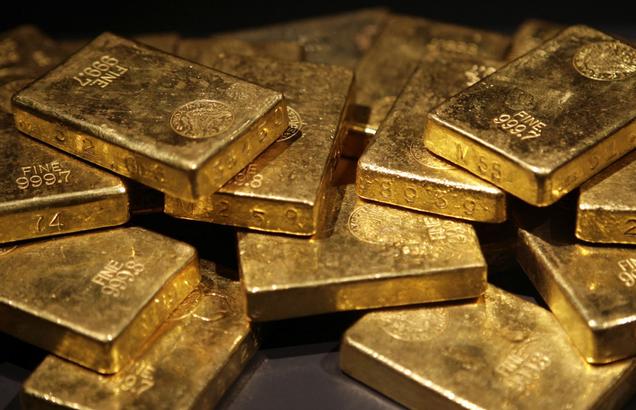 A few random jottings on gold while I’m out on the road; back in a week.
A few random jottings on gold while I’m out on the road; back in a week.
The other day, I came across this article in the Mises Daily, taken from Joseph T. Salerno’s testimony submitted to the U.S. House Subcommittee on Domestic Monetary Policy and Technology. It is a concise critique of the fundamental problem of fractional reserve banking. I do urge you to read it in full; Salerno arrives at the following conclusion:
The solution is to treat banking as any other business and permit it to operate on the free market — a market completely free of government guarantees of bank deposits and of the possibility of Fed bailouts. In order to achieve the latter, federal deposit insurance must be phased out and the Fed would have to be permanently and credibly deprived of its legal power to create bank reserves out of nothing. The best way to do this is to establish a genuine gold standard in which gold coins would circulate as cash and serve as bank reserves; at the same time the Fed must be stripped of its authority to issue notes and conduct open-market operations. Also, banks would once again be legally enabled to issue their own brands of notes, as they were in the 19th and early 20th century.
Last week, I was discussing the issue of the gold standard with the economics lecturer friend I mentioned in an earlier thread. He gave what I understand to be the standard argument against gold, that a country with negative terms of trade will see a flight of gold from the country. If domestic gold production does not meet the imbalance, eventually the country will run out of gold and will not be able to import anything. He then gave me a couple of freshman textbooks on micro- and macro-economics, the latter of which deals peremptorily with the issue in the final chapter. I do intend to read through these (thanks mate) and maybe take his institution’s freshman exam when I’m done.
I later had a think about this theory, which seems to exaggerate the gold argument into a straw man, implying that gold is not merely the only sustainable medium of exchange, but the only thing of any real value at all. A country with negative terms of trade still produces goods and services that can be exchanged for money, both domestically and abroad. If sold domestically, in a market where gold is in short supply, the products will attract less gold than if sold abroad. So producers will be more inclined to export their product, which will then go towards re-balancing the terms of trade. A self-correcting system, in other words.
But then, I imagine, the question will be raised, but what about a developing or struggling country with little in the way of exportable products? Such a country still has its labour force, which in such an environment would be in high demand. China today is the classic example of a nation benefiting form this, having both an exploding middle class as well as a vast pool of urban and rural cheap labour. As China progressively morphs into a first-world economy and its supply of cheap labour dries up, Brazil and sub-Saharan Africa appear to be the next beneficiaries of this phenomenon.
In the same vein (pun intended), the trade imbalance argument also appears to ignore foreign investment. When a rich foreign nation invests in a poorer or developing one, at least some proportion of that wealth remains in the target country (or there would be no point in their accepting such investment in the first place). In a global monetary system backed by gold, that means a gold inflow, again re-balancing the equation.
Those are my own inerudite, first impressions. For a more learned Austrian perspective on the gold standard and trade imbalances, a brief search of the von Mises Institute’s archive turns up this, this and this.
Quite apart from the issue of a gold standard of money, there is also some debate over the value of gold as merely one commodity among many. When James Delingpole the other day made passing reference to an earlier thread he did on gold, certain comments included opprobrium such as this:
James, get off the BS ‘goldbug’ bandwagon.
Gold is just as fiat as everything else (and for fractional reserve use and manipulation by bankers, it was even worse), and it’s just a commodity (the vast majority of it is used for jewellery ffs).
It’s an overinflated asset bubble (just like everything else), and those pushing the Ponzi Scheme will probably end up having the hounds set on them.
If what the goldbugs say, is correct, then nobody would be selling gold. Would they?
They are a bunch of snake oil salesmen looking for bagholders, and it does seem, James, that “Sold to YOU!” applies to you too.
PS. If we are stupid enough to revert to a gold standard, that means most of the World is condemned to live in perpetual poverty.
And this:
Agree, Gold is just another scam / asset bubble.
JD don’t know what he’s talking about….
This got me thinking. I certainly don’t make any claim to “know what I’m talking about”, in the sense the commenter probably meant it. So, not “knowing”, I went to check out the latest spot prices on gold (click charts for updated figures):
Since last year’s panic, when Europe’s collapse was widely believed to be imminent and fast-moving, and gold spiked at over US$1900/oz, there has been a tailing off. But note the 10-year trend. For the arbitrageur, gold might be indeed a risky short-term proposition. For the long-term investor, the chart speaks for itself. From $300 at the beginning of 2003 to $1588 closing last Friday: that’s an annualized return over 9.5 years of about 19%.
Gold investors holding the bag? Hugely over-leveraged ones, such as commodities traders, who are unnaturally vulnerable to short-term price fluctuations, perhaps; everyone else is a winner and a grinner.
And the dip from last year’s spike? Let’s compare the other three precious bullion spot prices; here’s silver:
Platinum:
And palladium:
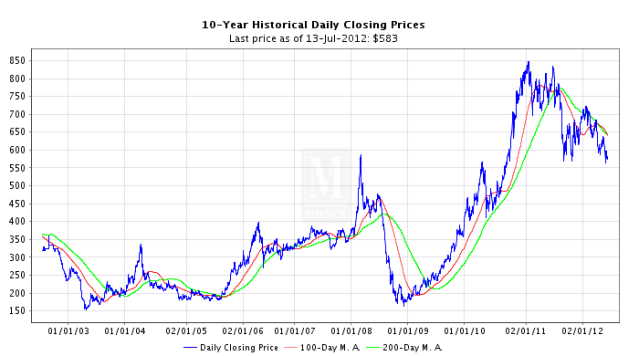 In other words, the dip in gold is nothing special; it has been reflected across the precious metals market. The long-term trend, though, is clear. And gold has been the most consistent of them all.
In other words, the dip in gold is nothing special; it has been reflected across the precious metals market. The long-term trend, though, is clear. And gold has been the most consistent of them all.
The Chinese are no fools; they are reputedly buying up all the gold and foreign real assets they can get their hands on—and largely using their U.S. dollar reserves to do it. Hard times are a-comin’, and those with foresight seek safe havens.
Over to you. I’m spending the week working up in sunny Queensland, and should be back by the weekend.

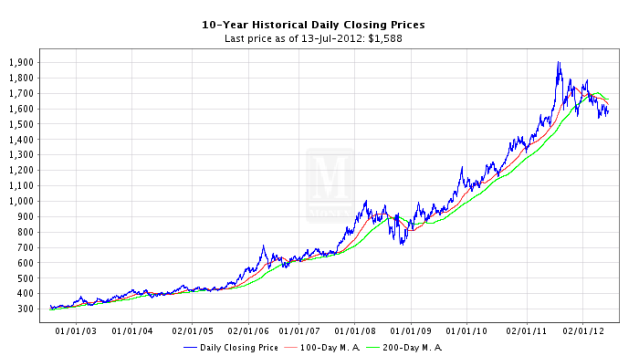
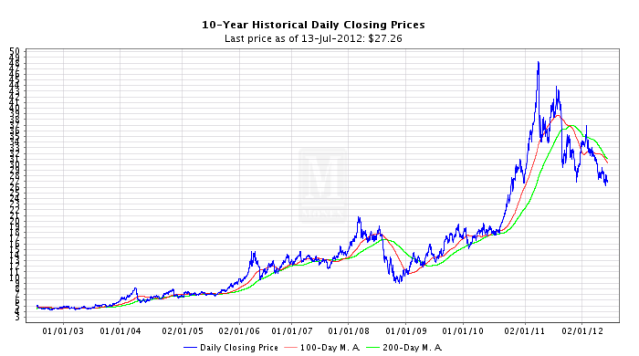
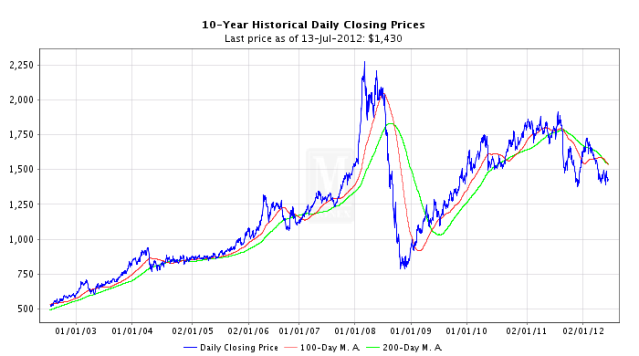
Ozboy, over the last 20 years , NZ farmland has increased in value by 10.7% annually, and anyone with half a clue could have made another 5% return on the invested capital by farming the land.
Gold just doesn’t cut it in the long run, but during turbulent times it can be a safe haven. When things return to normal quit it smartly.
Not sure of the situation in NZ, but when I said “foreign real assets” I was thinking primarily of Australian farm assets. Our Foreign Investment Review Board is having a busy time of it lately.
Re gold, I graphed the historical price of gold from 1850 to 2011, from this dataset:
Doesn’t really say much before 1971 that I haven’t covered back here. The dollar was fixed to gold back then, anyway. But when we zoom in on 1971 to the present:
$35/oz in 1971 to $1588 today is a more modest 9.75% annualized. Still a pretty good investment, but as you say, you can do better if you try. But dare I suggest that we are living in what the Chinese call “interesting times”? – Oz 😮
FB is referring to the sheep standard, a better standard is silver as it was for over1400 years the coinage of choice. Gold in the west always used to head east to pay for silks and spices.
In case you have not been attention a boat load of gold has been discovered in the Bismark sea as well as copper, in waters one mile deep, mining begins soon. This is the first of black smoker deposits they will mine. This will depress the value of gold as we are talking trillions of dollars of deposits.
Should be a nice little earner for the PNG government. Whoever the hell that is at the moment. But don’t kid yourself it will depress commodity prices for long; we’ve seen all this happen too many times before – Oz
A commodity money, like gold, has other uses besides its monetary one (“(the vast majority of it is used for jewellery ffs).”) Production of additional gold is costly, and therefore controlled by other demands for investment, and for the manpower and equipment used for mining.
By contrast, fiat printing is almost costless, and $100G to $100,000G Zim notes were cheaper than monopoly money, business card paper, and in some cases, cheaper even than toilet paper.
Because of the other demand for the money commodity, not all new production will find its way into circulation as money, and production of more of the commodity is a service, benefiting consumers.
Increase in fiat – is theft, plain and simple.
What commodity to use as money?
Gold was the money which emerged by the choices of the millions of individuals making their sales and purchases with each other.
The market again appears to be choosing gold, it is easily recognized, does not deteriorate, has high value for a small bulk, is almost infinitely divisible and is homogeneous.
Other monies may also arise; who knows what they may be?
Bonobos, our closest relatives, exchange goods and services for sex.
Who was it who said “when government gets involved in the money business, expect monkey business”?
Putting that together with the bonobos – if government is involved in the money business – expect to get shagged!
Seriously though, other monies have arisen in the past, and there is a really interesting read (Radford 1945) about the economic activities, and the emergence of a market money – cigarettes, and a failed food backed fiat money, in WWii prisoner of war camps. There’s a .PDF of it here, it is well worth looking at.
Click to access POWCampRadford.pdf
It’s interesting what you guys are saying about agricultural land…
some of our smaller, more specialist banks are owned by National Bank of Australia Group. They won’t lend for residential property development, but they will lend for agricultural land purchases.
The area around here has, probably five of the top ten grouse moors. They’re serious money, the Emir of Dubai has a shooting lodge and a moor in these parts, the guy who just sold a big name in breakfast cereals has another of the moors…
The interesting ones from an economics watching point of view, are the hedge fund managers.
a few years back, they were very gung ho about buying up agricultural land around the moors – not now though, they’re focussing very closely on land which will produce birds.
I’ve suspected for a while now, that agricultural land (and commodities) is where the QE printing is leaking out into the wider economy – that it is an inflationary bubble.
Perhaps (and I’m guessing) the hedge fund guys think the price has risen too high for them to profit further; Leave the last 5% for the suckers?
Ozboy you do realize the price of gold follows CO2 concentration in the atmosphere,
Then CO2 concentration must be going down. Hurrah! We’re saved!!! Oz 🙄
The other problem with a gold based currency is that the linkage of a currency with a fixed value base causes deflation. If output increases the prices fall reducing the returns to business and inhibiting investment. Adherence to the Gold standard is now blamed for the Great Depression of the 1930s.
Click to access c11482.pdf
If the value of a currency is fixed to the amount of gold then a national GDP, and in fact global GDP cannot grow faster than the rate of increased production of gold…
These are the usual objections to a Gold Standard for currencies. It is ALL voodoo economics of course, it works in theory but not in practise…
One alternative is to fix currency value to oil prices, this would inhibit burning the stuff, a subtle form of carbon tax. But as a shrinking resource with clear limits on rate/level of production this would impinge on economic growth. Another alternative is to base the currency on arboreal growth, by adopting e leaf as the basis for currency it ensures that money really does grow on trees… And encourages carbon sequestration! {grin}
Yawn!
What is wrong with the purchasing power of money increasing as goods are made more efficeintly?
@- Luton Ian
It makes wages jump in value and profits fall.
Unless employers cut wages or workers…. With all the social unrest that causes.
You’re making the keynesian assumption of wage figures being rigid downwards, and compounding that with the erroneous assumption that purchasing power should remain constant. It doesn’t, that is what economic development is all about; we become materially better off, then compounding it further, with reference to the special privileges which states confer upon unions, to legally engage in violent coercion.
You are also neglecting the point that without government stealing through inflation, it again becomes possible to save for your own retirement.
Incidentally, check out the form in which state retirement funds are held:
Bonds
The government has spent the money, what the fund consists of are promises to tax the population again, for the principal, plus interest, plus not inconsiderable admin costs.
Izen bullcrapped:
“If the value of a currency is fixed to the amount of gold then a national GDP, and in fact global GDP cannot grow faster than the rate of increased production of gold…”
Apart from GDP being a fallacious aggregate
You argued earlier about the supposed dangers of the purchasing power of money increasing ( instead of its current relentless decrease through over printing and fractional reserving)
How can you both argue using the answer to the “problem” which you pose, then argue that their is a problem?
The purchasing power of the money commodity changes – just as all other exchange relations on the market change, butter against bacon, cigarettes against bread…
@- Luton Ian
In view of the internal inconsistency, mutual contradiction and lack of predictive efficiency or falsifiablility of most economic theory I have no compunction in using any and all economic theory to undermine the whole premise….
The fact that over a couple of centuries the employed gained the right to collective organisation is a empirical social fact. You may have ideological dogmatisms that disapprove of this change, but it was hard fought, and won in most advanced societies and it is at the very least unrealistic to expect those powers to be rescinded or surrendered.
This makes the rigidity of wages an implicit characteristic of the modern economy, if your economic theory fails to work or adapt to that fact it is a failing of the economics, not the fault of the long evolution of the workers’ collective market power.
Izen,
Your first and last paragraphs are mutually incompatible.
I don’t see you condoning sloppy thought in any other field, why accept it in economics? (I won’t accept an appeal to popularity as an answer).
Now for the middle bit; Do you really condone violent coercion?
@- Luton Ian
All economic theory is sloppy, or at least most of it is like religious theology, it values theoretical purity over empirical rigour.
I do not condone violent coercion, but I recognise it is a common means by which social conflicts are resolved. Before modern societies accepted the validity of collective bargaining between workers and employers there were a number who ended up in Ozland for their termerity in trying to negotiate with civic or private authority.
Eventually of course a mutual agreement is reached that avoids violent coercion by either side. It is only the most barbarous nations that still use death squads and judicial punishment against union activity.
Union action often involves a great deal of unpleasantness, including violence, by both sides. I’ve only seen this at first hand when I was, briefly, a union member (not violence, fortunately, but unpleasantness). My life has been free of it since, and was free of it before. But the short period when I was a union member, was not the period when I earn’t the most, or had the most benefits of other sorts.
..I’m not making a point, just an observation.
“It is only the most barbarous nations that still use death squads and judicial punishment against union activity.”
Those being the nations which are into central planning, big style.
Regarding the epistemological basis for economic theory, I suggest this as a light intro:
http://mises.org/daily/6090/Praxeology-The-Methodology-of-Austrian-Economics
I’d be grateful if you’d do some trolling over there. The site is short of collectivist commenters who are capable of joined up thinking
Izen: The fact remains that violence may establish victory but it is by no means a witness to justice.
@- Amanda
Violent coercion is usually the sign of injustice perpetuated by authority.
Either by individuals or institutions.
@- Luton Ian
I am immensely flattered by the invitation to ‘troll’ at the Mise/Rothberd site, but there is a mature and comprehensive body of theory and argument there that I would feel a need to absorb before wading in…
And at present I am still trying to get up to speed on intergenerational ethics, complex adaptive systems and the latest developments in Hox gene networks and evo-devo!
Maybe I’ll put in the bookmarks of sites I check and see if anything comes up I can kibbutz on… {grin}
“Anyone who clings to the historically untrue — and — thoroughly immoral doctrine that violence never solves anything I would advise to conjure up the ghosts of Napoleon Bonaparte and the Duke of Wellington and let them debate it. The ghost of Hitler would referee. Violence, naked force, has settled more issues in history than has any other factor; and the contrary opinion is wishful thinking at its worst. Breeds that forget this basic truth have always paid for it with their lives and their freedoms.”
Robert A. Heinlein
Just remember that little tidbit, whether nations who use violent coerision or not. Granted, I think its always better to find a “non-violent” solution first or to use peaceful action first, but if your opponent is willing to use violence and you refuse to because of “wishful thinking” or some other belief, you will lose your life and its your own damn fault.
As for gold, its a huge volatile market. It can double in say 4-5 years, it can also lose its value that quickly. Sure, someone who held onto gold since 1971 would be rich, but at the end of the day that is the same as having 20-20 hindsight.
I would argue that gold might look good and tempting now, but in the end this is probably the time to sell when its high. There are other things you can invest in that are not as high as the precious metals, which undoubtably like history shows will go down in value once the recession ends.
I am not a prophet or oracle, so I can’t tell you when that will happen, but at some point we will get out of the current global-wide funk.
I will say this: inflation will be coming to the US + UK very soon. Its not going to be “destructive” but it will be fairly bad. Gold may or may not keep pace with this, because as I said it depends on its volatile nature.
On the other hand, keeping a diversified profile with this inflation coming and its effects being unpredictable means that gold may be a thing to hold onto if its a small part of your holdings. I argued similar on JD’s blog on this topic, but leaving it at that is probably best for now.
It’s less true to say that “gold is increasing in value” (as all the upward-curving graphs I have posted above imply – remember these are all gold vs dollars over time) than it is to say “paper dollars are becoming increasingly worthless”. So forget gold for a moment; take houses (another thing everyone needs). In 1970, one million Australian dollars would buy you 53 houses in Sydney, at the median price (with some change for a new car). In 2012, a million bucks will buy just one house, plus a small apartment in the outer ‘burbs. On that basis,a dollar has been losing about 9% of its value each year since 1970.
See what I mean? That’s about the same amount by which gold has increased in value since the same time, as we calculated above. So it’s fairer to say that gold has held its value – relative to houses, food staples, other precious metals, and so on – whereas paper money has lost value. And in turbulent times, like now into the near future, gold is likely to appreciate, then settle back down when the market regains faith – Oz
New post Denver Theater shooting….
Izen: Mmm. And quite possibly we shall agree that Honor Blackman looks very nice in Goldfinger. Love that balconette bra of her swimsuit, even if the 1960s hadn’t perfected bottoms…. Nothing like the 21st century for beachwear, I tell ya.
I put it up at the DT, but this 1874 quote from Benjamin Bristow, Secretary of the Treasury to United States President Ulysses S. Grant, says it all:
If they knew all this so long ago, why this madness now?
Keynes quoted Lenin saying pretty much the same thing in his “economic consequences of the peace” it’s about page 235.
Shows what a devious little POS Keynes was, that in his “General Theory” he then advocates doing exactly what Lenin had said would destroy civilization.
I’ve posted a load of links to gun crime research papers and people over at Kitler’s place.
Yowza. Gun law thread coming sometime round here – Oz
Oz: Answer: Because of the ‘need’ for ‘equality’ (of outcome).
That’s a fantastic quotation, by the way.
Ben…
Wellington as he starts his career in politics…
….’An extraordinary affair. I gave them their orders and they wanted to stay and discuss them.’
Napoleon on politics…
…….’A revolution is an idea which has found its bayonets.’
Hitler….Halt!!!!
…..
….’Demoralize the enemy from within by surprise, terror, sabotage, assassination. This is the war of the future.’….Round ein to ze little frenchman, you big pansy Wellington.
OT

Statist troll bingo card:
Hat tip; Vikning Vistas
G’day Ian,
Hilarious!
I’d like to fill in the blank square:
“Thou shalt not follow the multitude to do evil: neither shalt thou yield in judgment, to the opinion of the most part, to stray from the truth”
Exodus 23:2
New thread out soon – Oz